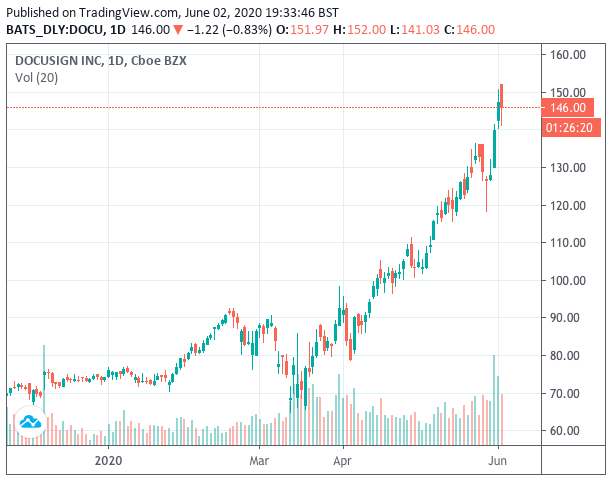
Wednesday, June 03, 2020
Can innovation ensure DocuSign share price growth beyond COVID-19?
By Century Financial in 'Brainy Bull'


Since its 2018 IPO, DocuSign’s [DOCU] share price has more than tripled. But how will the stock be affected following its Q1 earning’s report, scheduled for 4 June?
It’s no exaggeration to say that DocuSign has provided a much-needed upgrade to the way businesses sign legal agreements and contracts. It now serves more than half a million paying customers around the world, and in January announced full-year revenues of $974m — nearly triple the $250m it made in 2016.DocuSign’s share price benefited following the good news, rising 23% from the start of the year to a peak in late February.
The share price, like some many others, was initially hit by the coronavirus pandemic, before regaining ground in the following months. As of 1 June, DocuSign’s share price was up 98.6% for the year to date.
This week, the company is due to release its latest earnings update. Can it maintain this pace of share price growth?


What’s happening with DocuSign’s share price?
The company has built more than 350 integrations with other software providers, including Microsoft [MSFT], Google [GOOG], Apple [AAPL] and Salesforce [CRM], making its service more accessible and convenient while also making it more attractive to new customers. Meanwhile, a number of acquisitions over its lifetime have enabled DocuSign to strengthen its product offering and remain on top of the software-as-a-service (SaaS) market.
When DocuSign announced its last quarter earnings on 12 March, it reported earnings of $0.12 per share, beating consensus estimates of $0.05 according to MarketBeat, and representing a 100% increase from the same quarter last year, where it announced earnings of $0.06 per share.
DocuSign’s revenue also beat predictions, when it announced $274.90m for the quarter, an increase of 38% year-on-year and a surprise of +3.16% compared to the $266.48m analysts expected.


In a statement released alongside its Q4 results, DocuSign CEO Dan Springer (pictured) said: "The fourth quarter wrapped up an exceptional year for DocuSign. Since introducing the DocuSign Agreement Cloud a year ago, we have dramatically broadened our offerings while maintaining strong growth from eSignature. With our latest move — the proposed acquisition of contracts AI pioneer Seal Software — we are continuing our drive to make organizations' end-to-end agreement processes faster, simpler, and smarter."
Amid lockdown, business is growing
Like many SaaS companies, DocuSign is benefitting from lockdown measures and the increase of people working from home. For the financial, tech, legal, insurance and real estate industries, DocuSign’s solution provides a lifeline at a time where signing physical contracts has become incredibly impractical.
In its 2020 annual report, DocuSign stated: “We estimate that our total customer base of over 585,000 customers represents 1% of the estimated enterprises, commercial businesses, and VSBs in our current core target market worldwide.”


It’s a bold statement, but as the company continues to develop its technology and acquire other businesses, it also offers a glimpse of just how much room is left for growth.
Two of its most notable acquisitions include that of SpringCM in 2018 for $220m, and Seal Software in February this year for $188m. As companies accelerate their digital transformation plans in the midst of the coronavirus pandemic, these acquisitions have helped DocuSign stay ahead of the game.
“Being able to offer a suite of services from the start of a contract to the finish differentiates DocuSign from its eSignature rivals and increases the revenue it generates from its existing customers. More importantly, this distinction boosts the company's subscription revenue, an attractive reason to own a stock like DocuSign,” Donna Fuscaldo writes in The Motley Fool.


Is DocuSign a Buy?
According to Zacks, DocuSign is expected to report earnings of $0.11 per share this week, which would represent growth of 57.14% year-on-year. The consensus estimate indicates revenue of $284m, up 32.74% from the prior-year quarter.
As for the full year, Zacks expects earnings of $0.53 per share (up 70.97% year-on-year) on revenues of $1.31bn, up 34.43% year-on-year.
Although Zacks recently downgraded its rating for DocuSign from buy to hold, the consensus among 15 analysts polled by CNN Money is to buy. This comes from a majority of nine, with five giving the share price a hold rating and one giving an underperform.
Among 13 analysts offering 12-month share price forecasts, CNN Money reports a median target of $90, with a high estimate of $150 and a low of $80. The median estimate represents a -38.9% decrease from 1 June’s closing price of $147.22.


Source: This content has been produced by Opto trading intelligence for Century Financial and was originally published on cmcmarkets.com/en-gb/opto
Disclaimer: Past performance is not a reliable indicator of future results.
The material (whether or not it states any opinions) is for general information purposes only and does not take into account your personal circumstances or objectives. Nothing in this material is (or should be considered to be) financial, investment or other advice on which reliance should be placed. No opinion given in the material constitutes a recommendation by Century Financial or the author that any particular investment, security, transaction or investment strategy is suitable for any specific person.
Century Financial does not endorse or offer opinion on the trading strategies used by the author. Their trading strategies do not guarantee any return and Century Financial shall not be held responsible for any loss that you may incur, either directly or indirectly, arising from any investment based on any information contained herein.









.png)
.png)
.png)
.png)


